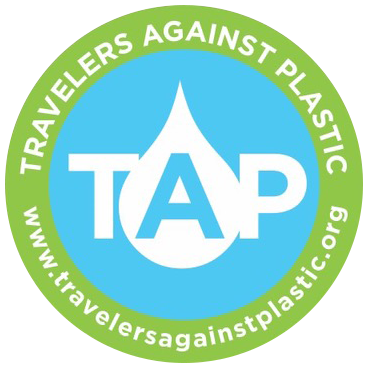By Bridey Scully – TAP Volunteer Coordinator
OCTOBER 17, 2018
By now, the problem with plastics is apparent to most people. Who has not seen the photo of a turtle with a straw stuck in it nose, or giant circling patches of plastic garbage in our oceans?
Globally, we produce 400 trillion tons of plastic, almost half of which is single-use, often discarded after less than 1 minute. Each year, at least 8 million tons of this plastic goes into our oceans. Plastic polymers make up the majority (60-90%) of marine litter. Plastics do not biodegrade, ensuring that they will last for centuries posing health risks for animals, humans, and ecosystems. Since we produce plastic at such a rapid and reckless rate, the implications for the future are serious, permeating all aspects of life on Earth (get more facts about the impact of plastics at Clean Seas). It’s a public health issue as well, with 93% of Americans testing positive for BPA in their blood (Geyer, J. R. Jambeck, K.Lavender Law (2017). It is also a justice issue, where many places in the world do not have access to clean drinking water, leaving bottled water as the only viable option.
Businesses have the ability to influence consumers. Many businesses are moving toward incorporating ethics and Corporate Social Responsibility (CSR) statements as a new norm in operations. It is your company’s values, which shape your actions on a local, regional, state, national, or industry level. CSR has become a term that many people recognize but may not have a grasp on how it translates to daily operations, work overseas, or environmental and social impacts. To remedy this, businesses need to move toward greater transparency; if plastic pollution is a concern to your company, let consumers know. Consumers are educating themselves on the impacts and long-lasting dangers of plastics in our world, and they’re using their knowledge to make informed purchasing decisions.
In 2014, Nielsen conducted a global poll of 30,000 consumers in 60 countries to determine how passionate consumers were about sustainable practices related to their purchases and their support of ecologically responsible efforts. More than half (55%) of participants expressed their willingness to pay extra for products and services from companies that were committed to positive social and environmental impact—an increase from 50% in 2012. This shows that individual consumers are changing their behavior based on what they believe is important, namely environmental and social impact. If consumers are changing their behaviors, shouldn’t companies change their behavior as well? Nielsen’s survey also found that for over half of consumers surveyed, information relayed via packaging was a major factor in their decision-making. These customers check labels to ensure that brands are committed to positive social and environmental impact. Adopting a plastic reduction message and displaying it on product packaging can increase revenue based on this study.
Now is the time for companies, businesses, and corporations to make tangible and innovative changes to do their part. In order for you to ensure the sustainable success of your company, moving beyond traditional CSR models to include targeted actions such as taking the TAP Pledge against single-use plastics in the workplace and in operations, is vital to staying on the same page as the majority of your customers. Many businesses have already incorporated plastic reduction messages in their CSR plans and some have gone further to work directly with NGOs and organizations to commit funds toward positive environmental impact. More than 40 companies, including Aldi, Nestle, Coca-Cola, Procter & Gamble, and PepsiCo, have joined a pact to cut plastic pollution over the next seven years. The firms have pledged to work on eliminating single-use packaging through better design, among other measures.
The question of cost versus profit is at the forefront of any business transaction. However, the values that customers hold dear go much deeper than packaging and labelling. Incorporating a plastic reduction message in your business’s CSR plan can reduce risk and provide opportunities for cost savings.
A plastic reduction message can be actualized in several ways. The most obvious is making a pledge to eliminate single-use plastics in all aspects of the business. In addition, your business should find innovative ways to reduce the use of plastics in packaging, sourcing recycled plastic, use only recyclable plastic in products and packaging, invest in alternative product and packaging materials, and work directly with suppliers and distributors that share values represented in your CSR plan. Seeking recycled products can also save manufacturers up to 90% on production costs, which translates to lower prices for consumers. Reusing materials can create up to 6 times more jobs then by sourcing new materials for products.
Taking TAP’s company pledge is a great way to your company accountable. Even with positive innovation, the urgency of the plastic pollution issue demands intention and tangible actions. The first steps to making a positive difference in the immense global plastic problem as a business are to 1) internalize the urgency of the issue as a business, and 2) add a plastic reduction message to your corporate social responsibility plan with clear ways to support it within your operations. The triple bottom line is that in order for businesses to thrive in a world of changing social and environmental values, they must act as leaders and incorporate a comprehensive CSR plan as an integral part of the company.
